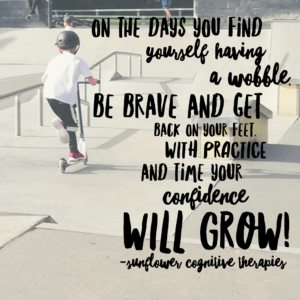Welcome to the new school year!
Five weeks into the new school year, children and young people around the country will hopefully now be settling back into the swing of things. Some having gone into full time school or starting out at Secondary, other’s reaching their final years in school, preparing for either SAT’S or GCSE Examinations.
Regardless of where a child may be in terms of their academic journey, one thing I know for sure is this, starting a new school year can evoke a range of different thoughts and feelings. As the new academic year loomed, heading back to school was a hot topic of discussion with children and young people in their therapy sessions.
Yes there was a lot of talk about feeling excited to meet up with friends, having a new teacher and moving to a new class. However whilst filled with excitement, at the same time, some were equally as nervous about the work a new year would bring; anticipation that moving up a year would mean the work becoming harder.
Routine and structure
Six weeks away from school is often seen as too long, whilst not all children may like the idea of being back at school, it does provide routine and structure and a chance to spend time with friends and learn. Routine and structure being something that often goes out of the window when the holidays arrive. By the last couple of weeks of the summer holiday’s it was fair to say that my boys were ready to go back to school, to see friends, learn and also have time out from one another.
There is no denying, I love having time out together as a family; from early morning trips to the skate park with free rein to master jumps and practice tricks before heading into the park, to afternoons spent at the seaside building sandcastles, searching for special stones and jumping the waves. As the dark nights are setting in, the six week holiday’s seems like a distant memory nonetheless, these are the memories I will be bottling up for the rainy days!
If truth be told, I too was ready for school returning for some structure and normality. Speaking to friends and other parents, I know that I was not alone with this one either. Still, taking the obligatory first day back photo and waving off my boys on their first day back was emotional to say the very least!
Starting out in Reception means no afternoon play dates with friends and a jump from Key Stage 1 to Key Stage 2 (or what was known as Infants to Juniors) means no afternoon play time and an increase focus on academic attainment, both providing me with the confirmation; my boys are growing up fast!
Setting goals, empowering children to believe, succeed and achieve!
In a previous post back in March I wrote about the ‘New Year’ being a time to think of new year resolutions. As adults we often set ourselves targets or challenges; developing a healthier lifestyle, joining a club, making time for friends or taking up a new hobby.
Why wait for January to set goals with young people when we are provided with a variety of chances throughout the year; the start of a new academic year, after every holiday or even at the start of a new week! These are all prime opportunities to build on motivation, developing children and young people’s emotionally resilience and helping them to grow.
Why are goals important?
Having a goal help you to stay on track, giving you a focus and something to aim for. Yes, some of the steps along the way might be challenging and you might feel like your goal is impossible at times but setting goals can help make you feel more motivated!
When faced with a mountain of challenges it can be hard to think positively. By keeping a record of positive comments or achievements made over the days/weeks, no matter how small they may seem at the time encourages you to recognise the actual facts in front of you. The positive steps you have made!
‘Remember, it’s the small steps we take that help us achieve our long-term goals.’
Setting goals with children from an early age, if done in the right way, can encourage self belief and an ‘I can do this’ mental attitude. How many times do we see or hear children moving from one hobby to the next, either as a result of losing interest or finding it too much of a challenge and therefore refusing to go back.
What we do know is that whilst some children respond exceptionally well to the positive praise alone, others find this hard to take on board; children who lack confidence and self belief sometimes need that extra reminder that they can do this!
Positive reminders for encouraging growth
Positive reminders could include visual aids such as reward charts or little notes of encouragement. Having simple yet effective tools to hand that parents, teachers and professionals alike can use, provide children with that extra boost of encouragement they just might need to continue working towards their goal. Plant Love Grow has always been one of my first ‘go to’ websites, as well as Big life Journal, both providing a range of visual tools beautifully designed to help inspire children and young people. These are invaluable resources that cover various topics and something I frequently recommend to both professionals and parents.
Teaching children the power of persistence…
Yes, it might be that some young people might reach their goal before others leaving other children feeling defeated. It is important however that we teach our children to not give up!
Speaking as a parent, there are two things that I am certain of:
- I want my boys to be happy! I want them to have confidence and believe in themselves, to be resilient when faced with new challenges. Helping them learn how to tackle problems and see the importance of not giving up when life throws them a curve ball.
- You will never get two siblings exactly the same! Everyone has their own style, characteristics that forms their personalities, making each and everyone of us unique. Yes, we may see similar mannerisms and temperaments but as I tell clients, ‘the world would be a boring place if we were all the same‘.
When we attempt to teach children the same skill, there can sometimes be an expectation of, ‘if it worked for one child it must definitely work for another’. When actually what we do know is that everyone learns differently. Thinking about this from the viewpoint of a therapist and also as a mum, regardless of how our children learn I believe it is important to emphases that it may mean having to take a different approach to tackling a problem and finding a solution, but this is okay. We must learn to overcome hurdles, draw upon our strengths but most importantly learn to adapt along the way.



